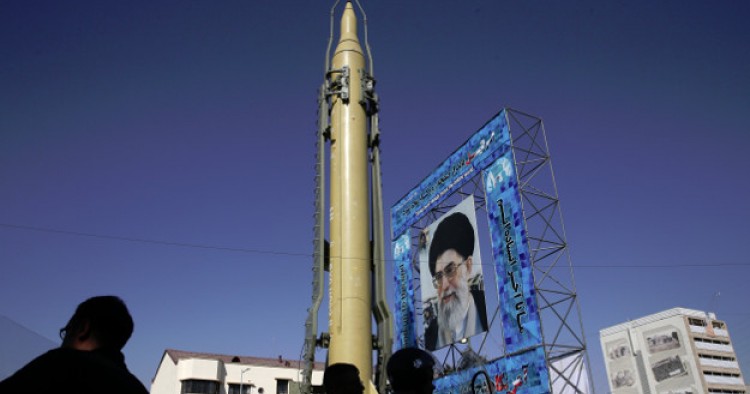The Iranian Parliament said in a statement today that the missile strikes in Syria by the Islamic Revolution Guards Corps (I.R.G.C.) made it clear that U.S. sanctions against Iran’s missile program have been meaningless. The statement said the strikes marked the beginning of a “new and major” chapter in Tehran’s war against terrorism and accused the United States and its allies of supporting terrorism in the region. “Another message of this significant action by the Islamic Revolution Guards Corps was aimed at the U.S. Congress that we pay no value to anti-Iranian bills of the Congress.” It added that the parliament will soon announce a “decisive response” to the latest U.S. measures. “No pressure by the American side or new sanctions, which clearly violate the J.C.P.O.A. [Joint Comprehensive Plan of Action; the 2015 nuclear agreement], will impact the strong determination of the Islamic Republic of Iran and the great nation of Iran to enhance the deterrence [Iran’s] power against potential enemy attacks. Today, a small portion of this power and [Iran’s] growing ability to deal with such conspiracies were put on display.”
Comment: The I.R.G.C.’s missile strikes against Islamic State positions in Syria received strong support from all political factions inside Iran, including reformist politicians and cabinet members of the Rouhani government. Foreign Minister Javad Zarif also took to Twitter to defend Iran’s missile program: “Iran's missile capability protects its citizens in lawful self-defense & advances common global fight to eradicate ISIS & extremist terror.” Senior Iranian clerics also praised the missile attacks as a projection of Iran’s military might. Major General Mohammad Bagheri, the chief of staff of the Iranian Armed Forces, also hailed Iran’s missile power and claimed that the “hegemonic powers” cannot confront the Islamic Republic. “Thanks to the blood of martyrs and efforts made by domestic scientists, we are now one of the world’s biggest powers in the field of missiles,” he claimed.
Sunday’s strikes – the first missile attack in Syria by the I.R.G.C. from inside Iran – came at a time of heightening tension between Washington and Tehran. In recent weeks, the U.S. military has conducted several air strikes against Iranian-supported forces in Syria. And Washington has also been ratcheting up pressure on Iran’s missile program. Last week, the U.S. Senate overwhelmingly passed a legislation that would impose new sanctions on Iran’s ballistic missile program, support for terrorism and human rights abuses. But the Iranian response has been one of defiance. Iran’s Foreign Ministry said on Friday that new U.S. sanctions would not force Tehran to halt its missile program.
Last month, the Iranian defense minister claimed that the country has achieved self-sufficiency in the field of producing military hardware, particularly ballistic missiles. “Today, we have reached a point that we can design and produce all of our needs in the area of ballistic and cruise missiles,” Brigadier General Hossein Dehghan said at a gathering in Tehran. “We have cruise missiles with a range of 300 km,” he added. His remarks came a day after another senior Iranian military official announced that the country had recently built a third underground ballistic missile production factory. “We will increase our missile power. Our enemies, the United States and the Zionist regime (Israel) are naturally upset and get angry at our missile production, tests and underground missile facilities because they want Iran to be in a weak position," Brigadier General Amir Ali Hajizadeh told a public gathering in the southwestern Iran.
There is a consensus among political and military leaders in Tehran to continue and further advance Iran’s missile technology at any cost. At the first press conference since winning reelection, President Hassan Rouhani said last month that the Islamic Republic would continue its ballistic missile program despite Washington’s concerns. “American authorities should know that whenever we need to test a missile for technical reasons, we will carry it out. And we will not wait for them or their permission,” he said defiantly after U.S. and Saudi leaders criticized Tehran’s regional policies at the Riyadh summit. Iran’s Supreme Leader Ali Khamenei also stressed that his country would further enhance its missile power “We have missiles and they are very precise. They can hit targets with precision from thousands of kilometers away. We will forcefully preserve and enhance this capability.”
While the nuclear agreement does not address Iran’s missile program, the subsequent U.N. Security Council Resolution 2231 “calls upon Iran not to undertake any activity related to ballistic missiles designed to be capable of delivering nuclear weapons, including launches using such ballistic missile technology.” Iranian leaders argue that the country’s missiles are not designed to carry nuclear warheads, but U.S. officials say some of the missiles Iran has tested after the 2015 nuclear deal have been "inherently capable of delivering nuclear weapons" and are "in defiance of" the U.N. resolution.
The Middle East Institute (MEI) is an independent, non-partisan, non-for-profit, educational organization. It does not engage in advocacy and its scholars’ opinions are their own. MEI welcomes financial donations, but retains sole editorial control over its work and its publications reflect only the authors’ views. For a listing of MEI donors, please click here.













